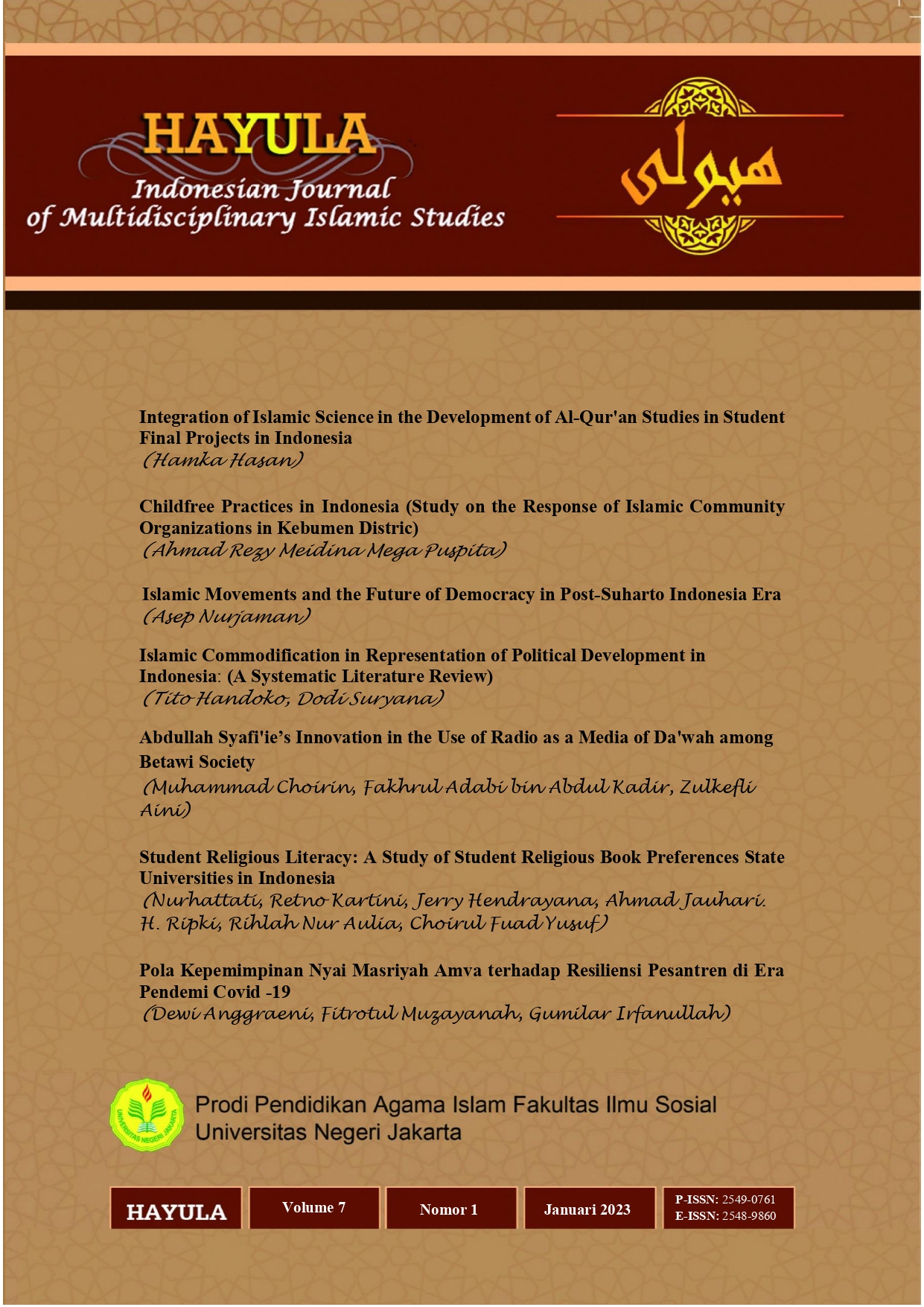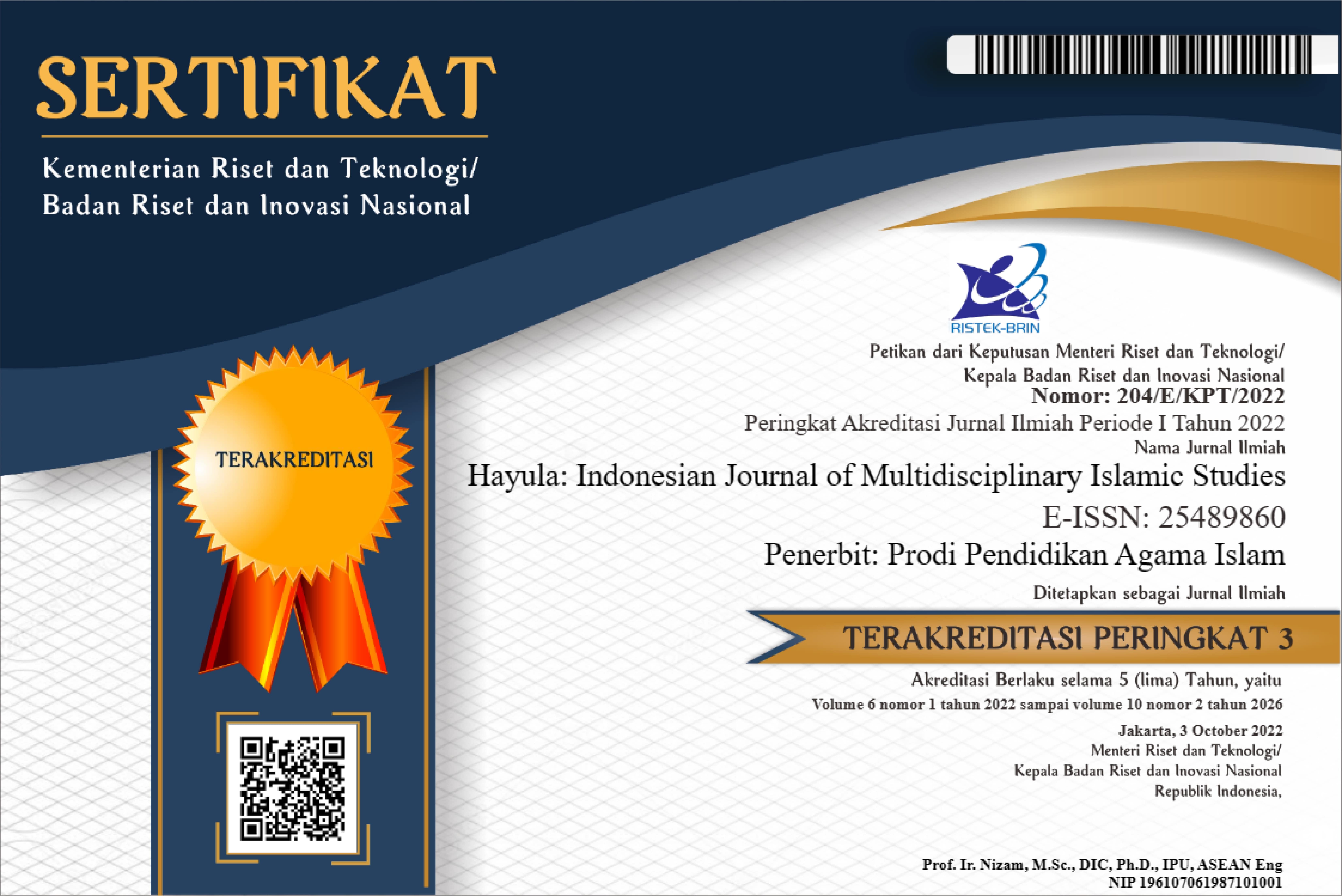Integration of Islamic Science in the Development of Al-Qur'an Studies in Student Final Projects in Indonesia
DOI:
https://doi.org/10.21009/hayula.007.01.01Keywords:
Integration, Islamic Science, al-Qur'anAbstract
This study aims to explain the integration of science and Islam contained in the vision and mission of UIN Syarif Hidayatullah Jakarta, Indonesia, as seen in the theme of my student thesis at the Faculty of Science and Technology. This research is qualitative. The object of study for the Faculty of Science and Technology student thesis is the Informatics Systems Study Program at UIN Syarif Hidayatullah Jakarta. Implementation of research in 2000–2020 The instrument used is an observation of the thesis theme, which aims to map the thesis from a scientific integration perspective. Interview techniques and questionnaires for lecturers and students via Google Forms are used to obtain information about obstacles and solutions in student research related to scientific integration. According to the study's findings, there has been scientific integration in final student assignments in the form of a thesis theme that connects science and the study of the Qur'an with all of its obstacles and challenges. With the concept of policy implementation, it was found that the cause of these obstacles was the vision of scientific integration at the university level, which needed to be entirely appropriately coordinated. The implication is the lack of synchronization between university programs and the units below them. The findings of this study will show a new relationship between religion and science that students can implement in their thesis.
References
Aji, T. S., Karim, A., Hori, M., Maryati, S., Nurkholis, Sudin, M., Surono, Jakaria, Irfan, A., & Nurjannah, W. (2020). The Concept of Togetherness and its Implications for the Unity of the Society : Study of Elucidation by Quthb. International Journal of Psychosocial Rehabilitation, 24(08), 13800–13808. https://doi.org/10.37200/IJPR/V24I8/PR28136
Akasyah, R. J. (2012). at-Takamul al-Ma’rify Atsaruhu fi at-Ta’lim al-Jami’ wa Dharuratuhu al-Hadhariyah. al-Ma’had al-Alamy li al-Fikr al-Islamy.
Aprison, W. (2017). Pandangan M. Quraish Shihab tentang Posisi Alquran dalam Pengembangan Ilmu. MADANIA: Jurnal Kajian Keislaman, 21(2). https://doi.org/10.29300/madania.v21i2.602
Aryani, S. A., Sunarsih, S., & Abadi, K. R. (2018). Scientific Paradigm Towards World-Class University: Comparative Study on UIN Sunan Kalijaga Yogyakarta and UIN Maulana Malik Ibrahim Malang. ESENSIA: Jurnal Ilmu-Ilmu Ushuluddin, 18(1). https://doi.org/10.14421/esensia.v18i1.1467
Bahri, M. Z. (2018). Expressing political and religious identity: Religion-science relations in Indonesian Muslim Thinkers 1970-2014. Al-Jami’ah, 56(1). https://doi.org/10.14421/ajis.2018.561.155-186
Daneshgar, M. (2015). An Approach to Science in the Quran. In Oriente Moderno (Vol. 95, Issues 1–2). https://doi.org/10.1163/22138617-12340076
Daneshgar, M. (2020). The future of islam and science: philosophical grounds: with Majid Daneshgar, “The Future of Islam and Science: Philosophical Grounds”; Biliana Popova, “Islamic Philosophy and Artificial Intelligence: Epistemological Arguments”; Mohsen Feyzbakhsh, “Theori. Zygon. https://doi.org/10.1111/zygo.12647
Danforth, L. M. (2019). 4. Finding Science in the Quran. In Crossing the Kingdom. https://doi.org/10.1525/9780520964518-007
Darwis, M., & Rantika, M. (2018). Konsep Integrasi Keilmuan dalam Perspektif Pemikiran Imam Suprayogo. Fitra, 4(1).
de Arruda Leite, J. P., & Buainain, A. M. (2013). Organizational coordination in public policy implementation: Practical dimensions and conceptual elements. Central European Journal of Public Policy, 7(2).
Fikriyah, Karim, A., Huda, M. K., & Sumiati, A. (2021). Spiritual leadership: The case of instilling values in students through the Kiai’s program in the globalization era. Journal of Leadership in Organizations, 3(1), 16–30. https://doi.org/https://doi.org/10.22146/jlo.63922
Mansir, F., & Karim, A. (2020). Fiqh learning methodology in responding social issues in Madrasa. Tarbiya: Journal of Education in Muslim Society, 7(2), 241–251. http://journal.uinjkt.ac.id/index.php/tarbiya
Haftador, H. R. (2015). An investigation of basic aspects of the quranic miracle. Asian Social
Science, 11(7), 38–42. https://doi.org/10.5539/ass.v11n7p38
Jamal, N. (2017). Model-Model Integrasi Keilmuan Perguruan Tinggi Keagamaan Islam. KABILAH : Journal of Social Community, 2(1). https://doi.org/10.35127/kbl.v2i1.3088
Karim, A., & Afnan, D. (2020). Kiai interpersonal managerial: Henry Minztberg perspective. Journal of Leadership in Organizations, 2(2), 75–90. https://doi.org/https://doi.org/10.22146/jlo.56290
Karim, A., Bakhtiar, A., Sahrodi, J., & Chang, P. H. (2022). Spiritual leadership behaviors in religious workplace : the case of pesantren. International Journal of Leadership in
Education, 00(00), 1–29. https://doi.org/10.1080/13603124.2022.2076285
Karim, A., & Wajdi, F. (2019). Propaganda and da’wah in digital era (A case of hoax cyber-bullying against ulama). KARSA: Jurnal Sosial Dan Budaya Keislaman, 27(1), 171–
202. https://doi.org/10.19105/karsa.v27i1.1921
Kasmo, M. A., Zin, M. Z. M., & Sakat, A. A. (2012). Critical analysis on the relation between religion and science. Advances in Natural and Applied Sciences, 6(3 SPECL.ISSUE 2).
Mugambwa, J., Nabeta, N., Ngoma, M., Rudaheranwa, N., Kaberuka, W., & Munene, J. C. (2018). Policy Implementation: Conceptual Foundations, Accumulated Wisdom and New Directions. Journal of Public Administration and Governance, 8(3). https://doi.org/10.5296/jpag.v8i3.13609
Mukri, M., Faisal, F., Anwar, S., & Asriani, A. (2019). Quran-integrated science in the era of industrial revolution 4.0. Journal of Physics: Conference Series, 1155(1). https://doi.org/10.1088/1742-6596/1155/1/012001
Nugraha, M. T. (2020). Integrasi Ilmu dan Agama: Praktik Islamisasi Ilmu Pengetahuan Umum di Perguruan Tinggi. Al-Hikmah: Jurnal Agama Dan Ilmu Pengetahuan, 17(1). https://doi.org/10.25299/al-hikmah:jaip.2020.vol17(1).3927
Oktaviani, D., Bijaksana, M. A., & Asror, I. (2019). Building a database of recurring text in the Quran and its translation. Procedia Computer Science, 157, 125–133. https://doi.org/10.1016/j.procs.2019.08.149
Parhan, M., Faiz, A., Karim, A., Nugraha, R. H., Subakti, G. E., Rindu, M., Islamy, F., Budiyanti, N., Fuadin, A., & Tantowi, Y. A. (2020). Internalization Values of Islamic Education at. International Journal of Psychosocial Rehabilitation, 24(08), 14778–14791. https://doi.org/10.37200/IJPR/V24I8/PR281455
Parinduri, M. A., Karim, A., & Lestari, H. (2020). Main values of Toba Muslim Batak culture in moral education perspective. Karsa: Journal of Social and Islamic Culture, 28(1), 121–140. https://doi.org/DOI: 10.19105/karsa.v27i1.2567
Putra, D. I. A., & Hidayaturrahman, M. (2020). The roles of technology in al-Quran exegesis in Indonesia. Technology in Society, 63, 101418. https://doi.org/https://doi.org/10.1016/j.techsoc.2020.101418
R., N. (2020). Issues Related to Science in the Quran. Iasaýı Ýnıversıtetіnіń Habarshysy, 118(4). https://doi.org/10.47526/2020/2664-0686.036
Rahmati, R. (2018). The journey of isra’ and mi’raj in quran and science perspective. Ar Raniry : International Journal of Islamic Studies, 4(2). https://doi.org/10.20859/jar.v4i2.143
Rais, M. (2017). Kapasitas UIN Alauddin Makassar pasca alih status. Edukasi: Jurnal Penelitian Pendidikan Agama Dan Keagamaan, 15(3). https://doi.org/10.32729/edukasi.v15i3.455
Saftri, E., & Sa’dudin, I. (2019). Aplikasi integrasi interkoneksi keilmuan di lembaga pendidikan tinggi. Tadrib: Jurnal Pendidikan Agama Islam, 5(1). https://doi.org/10.19109/tadrib.v5i1.2731
Setiawan, I. S. (2018). Islam dan Nasionalisme: Pandangan Pembaharu Pendidikan Islam Ahmad Dahlan dan Abdulwahab Khasbullah. Hayula: Indonesian Journal of Multidisciplinary Islamic Studies, 2(1). https://doi.org/10.21009/hayula.002.1.01
Tabbaa, H. M. A., & Soudan, B. (2015). Computer-Aided Training for Quranic Recitation. Procedia - Social and Behavioral Sciences, 192, 778–787. https://doi.org/https://doi.org/10.1016/j.sbspro.2015.06.092
Wajdi, F., & Nur Aulia, R. (2019). Ma‘had ’Aly and the Challenge of Modernizing Islamic Education in Indonesia. Hayula: Indonesian Journal of Multidisciplinary Islamic Studies, 3(2), 173-190. https://doi.org/10.21009/hayula.003.2.04
Zafar, A., & Iqbal, A. (2020). Application of soft computing techniques in machine reading of Quranic Kufic manuscripts. Journal of King Saud University - Computer and Information Sciences, xxxx. https://doi.org/10.1016/j.jksuci.2020.04.017
عكاشة, ر. ج. (2012). التكامل المعرفي أثره في التعليم الجامعي وضرورته الحضارية. المعهد العالمي للفكر الإسلامي.
Downloads
Published
How to Cite
Issue
Section
License
Authors who publish with this Journal agree to the following terms:
- Author retain copyright and grant the journal right of first publication with the work simultaneously licensed under a creative commons attribution licensethat allow others to share the work within an acknowledgement of the work’s authorship and initial publication of this journal.
- Authors are able to enter into separate, additional contractual arrangementfor the non-exclusive distribution of the journal’s published version of the work (e.g. acknowledgement of its initial publication in this journal).
- Authors are permitted and encouraged to post their work online(e.g. in institutional repositories or on their websites) prior to and during the submission process, as it can lead to productive exchanges, as well as earlier and greater citation of published works.
Users/public use of this website will be licensed to CC BY







